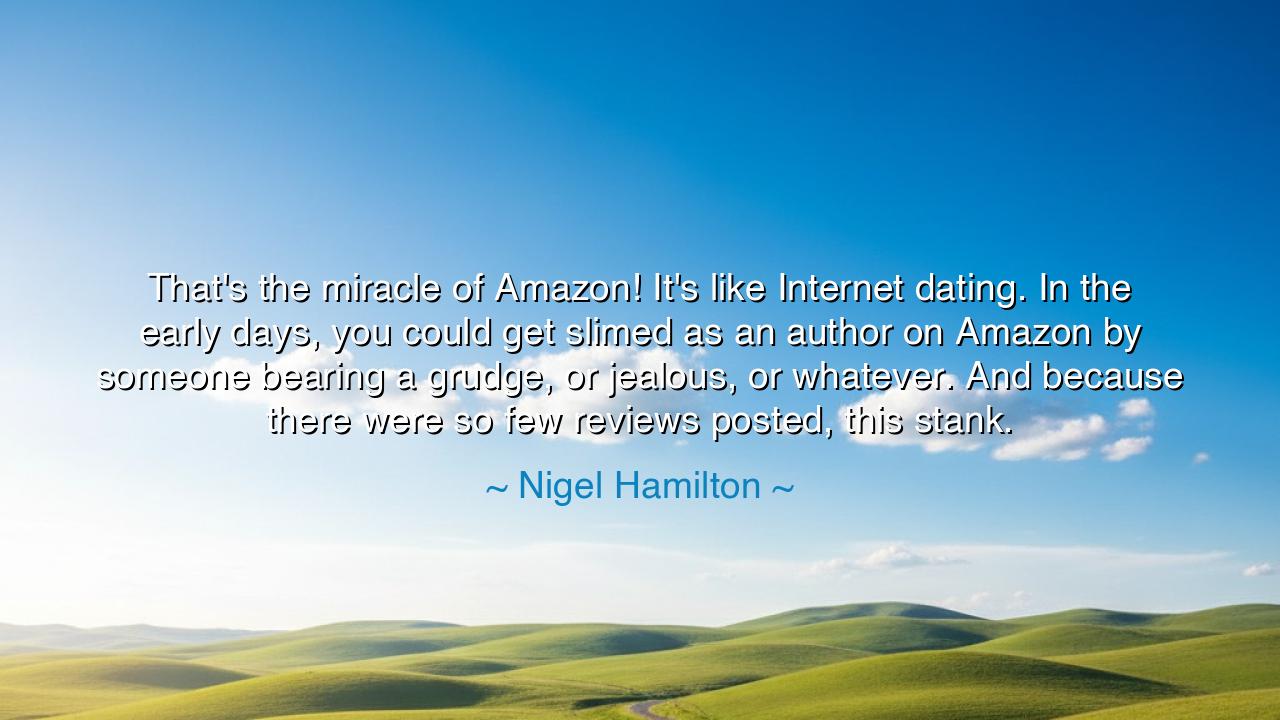
That's the miracle of Amazon! It's like Internet dating. In the
That's the miracle of Amazon! It's like Internet dating. In the early days, you could get slimed as an author on Amazon by someone bearing a grudge, or jealous, or whatever. And because there were so few reviews posted, this stank.






In the bustling bazaar of modern letters, a dry laugh slips beneath a warning: “That’s the miracle of Amazon! It’s like Internet dating. In the early days, you could get slimed as an author on Amazon by someone bearing a grudge, or jealous, or whatever. And because there were so few reviews posted, this stank.” Hear the cadence—half-jest, half-judgment. Nigel Hamilton names the strange alchemy of reputation online: how a handful of words, thrown like pebbles into a shallow pool, can color the whole water. The comparison to Internet dating is exact: profiles and star-ratings become masks and mirrors, and the lonely math of small numbers gives a single voice the power of a chorus.
To call it a miracle is double-edged. The marketplace opens its gates to everyone—reader and author, stranger and friend—and discovery multiplies. But every miracle casts a shadow: the ease that lifts the worthy also raises the petty, the jealous, the aggrieved. In the early days, when shelves were sparse with reviews, a lone bad-faith judgment could tilt the table. A book might wake to find its public face smeared, not by fair critique, but by a grudge uncoiling in the dark. As with Internet dating, where a single photo and a sentence can crown or condemn, the economy of first impressions governs the heart.
Hamilton’s complaint is not against judgment itself but against thin sampling and anonymous bile—the mathematics of small crowds. In any commons, scale is a kind of mercy: many true voices dilute the toxin; patterns emerge; the outlier is seen for what it is. But where the pool is shallow, a drop of ink becomes an ocean. Thus “this stank”—not because disagreement is foul, but because the scent of vendetta overwhelms the honest air of discourse. The lesson is old as the agora: when witnesses are few, bias shouts; when testimony grows, truth can be heard at its normal volume.
Consider a tale fit for teaching. A debut novelist—call her Eda—launched her book into that first thin season. Two reviews appeared: one from a stranger who’d read with care and named both light and flaw; another from a former colleague, masked and angry, who wrote three sentences salted with knowing cruelty. For weeks the venom sat at the top—algorithm mistaking promptness for authority—while readers hesitated at the door. Then a book club took Eda’s work to heart and wrote ten considered notes. The tide turned. The cruel sentence did not disappear, but it shrank to its proper size, like a heckler swallowed by a crowd that has decided to listen.
History echoes this dynamic. In the pamphlet wars of eighteenth-century London, a single broadside—cheap, fast, unvouched—could smear a thinker before any rebuttal could travel. Coffeehouses learned to stack sources: to post multiple replies, to let letters accumulate until the heat cooled and the light grew. The same cure holds now. A thicker chorus humbles the hit-and-run; a culture of citation steadies the pulse. The marketplace matures as its memory lengthens.
What wisdom, then, to pass down? First, be slow to crown or crucify by star-count alone—especially in the early days of a work’s life. Read the text of the reviews, not just their numerals; weigh specificity over splash, reasons over rage. Second, if you love a book, lend it your honest witness: a paragraph beats a cheer; a fair objection beats a blind hosanna. Third, platforms must apprentice themselves to justice: surface verified readers, downrank obvious vendettas, and design for context so that one bad pebble cannot stain the spring.
Let the counsel be practical. As readers: leave thoughtful reviews when moved, and refuse the quick contempt that smells of jealous sport. As writers: meet bile with patience; encourage your real audience to speak; keep making the work that will outlast a slimed morning. As stewards of marketplaces: build tools that widen the sample—verified purchases, reputation for reviewers, visible histories that separate the grudge from the good-faith critique. Do this, and the “miracle” will deserve its name: a commons where discovery thrives, where first impressions are tempered by second thought, and where, even online, the long conversation bends toward truth rather than the stank of a single, unlovely shout.






AAdministratorAdministrator
Welcome, honored guests. Please leave a comment, we will respond soon